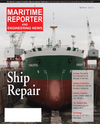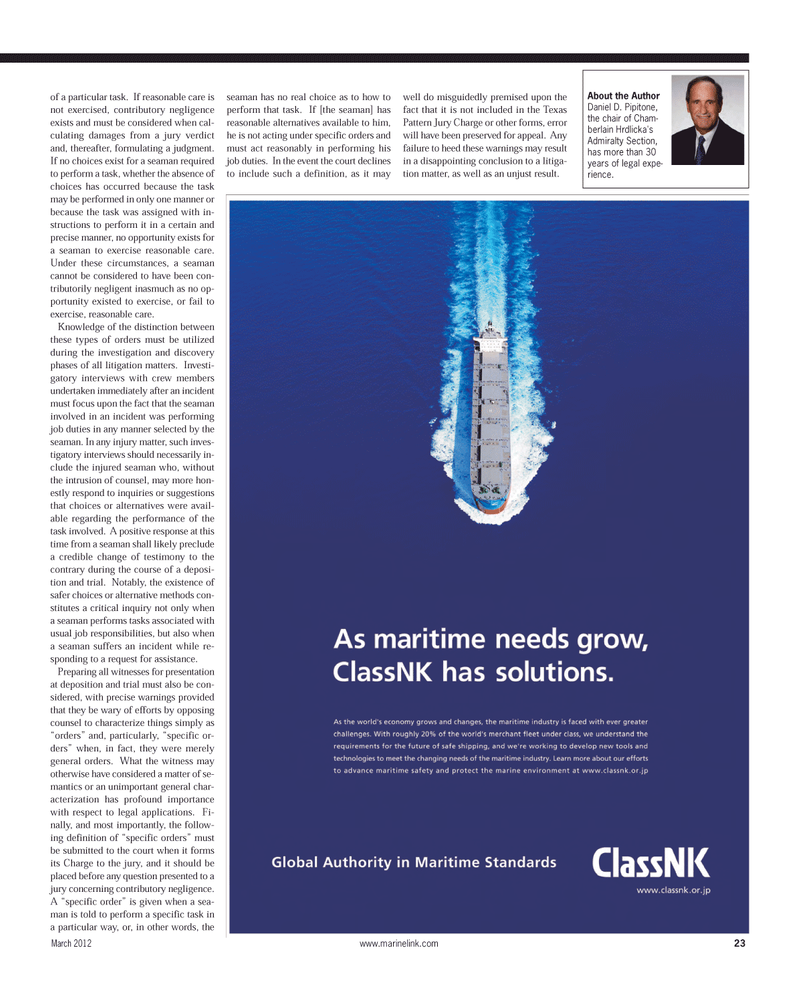
Page 23: of Maritime Reporter Magazine (March 2012)
The Ship Repair Edition
Read this page in Pdf, Flash or Html5 edition of March 2012 Maritime Reporter Magazine
of a particular task. If reasonable care isnot exercised, contributory negligence exists and must be considered when cal- culating damages from a jury verdict and, thereafter, formulating a judgment. If no choices exist for a seaman required to perform a task, whether the absence ofchoices has occurred because the taskmay be performed in only one manner orbecause the task was assigned with in- structions to perform it in a certain andprecise manner, no opportunity exists for a seaman to exercise reasonable care. Under these circumstances, a seamancannot be considered to have been con- tributorily negligent inasmuch as no op- portunity existed to exercise, or fail to exercise, reasonable care. Knowledge of the distinction between these types of orders must be utilizedduring the investigation and discovery phases of all litigation matters. Investi- gatory interviews with crew members undertaken immediately after an incident must focus upon the fact that the seaman involved in an incident was performing job duties in any manner selected by the seaman. In any injury matter, such inves- tigatory interviews should necessarily in- clude the injured seaman who, withoutthe intrusion of counsel, may more hon-estly respond to inquiries or suggestionsthat choices or alternatives were avail- able regarding the performance of the task involved. A positive response at this time from a seaman shall likely preclude a credible change of testimony to the contrary during the course of a deposi-tion and trial. Notably, the existence of safer choices or alternative methods con- stitutes a critical inquiry not only whena seaman performs tasks associated withusual job responsibilities, but also when a seaman suffers an incident while re- sponding to a request for assistance. Preparing all witnesses for presentationat deposition and trial must also be con-sidered, with precise warnings provided that they be wary of efforts by opposing counsel to characterize things simply as?orders? and, particularly, ?specific or- ders? when, in fact, they were merely general orders. What the witness may otherwise have considered a matter of se- mantics or an unimportant general char- acterization has profound importancewith respect to legal applications. Fi- nally, and most importantly, the follow- ing definition of ?specific orders? must be submitted to the court when it formsits Charge to the jury, and it should be placed before any question presented to a jury concerning contributory negligence. A ?specific order? is given when a sea- man is told to perform a specific task in a particular way, or, in other words, the seaman has no real choice as to how to perform that task. If [the seaman] hasreasonable alternatives available to him, he is not acting under specific orders and must act reasonably in performing hisjob duties. In the event the court declines to include such a definition, as it may well do misguidedly premised upon thefact that it is not included in the Texas Pattern Jury Charge or other forms, error will have been preserved for appeal. Any failure to heed these warnings may result in a disappointing conclusion to a litiga- tion matter, as well as an unjust result. March 2012 www.marinelink.com 23About the AuthorDaniel D. Pipitone,the chair of Cham-berlain Hrdlicka's Admiralty Section,has more than 30 years of legal expe-rience. MR March 12 # 3 (17-24):MR Template 3/2/2012 9:05 AM Page 23

 22
22

 24
24
